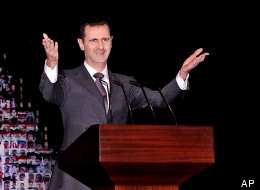On January 6, Syrian President Bashar al-Assad gave his first public speech in six months to a crowd of supporters in an opera house in central Damascus. He showed no signs of releasing his tenuous grip on power, ignoring international pressure to step down, and the opposition as they gain ground in the suburbs of Assad’s Damascus stronghold. Many are calling Assad’s speech “defiant” and “out of touch,” as he blamed the opposition forces—which he called West-backed “terrorists” and “murderous criminals” in his speech—for the 21 months of bloody conflict that has killed 60,000 so far, and refused to negotiate with any armed groups. It is just as well for opposition, however, as any peace plan in which Assad remains in power is probably a non-starter.
But how “defiant” and “out of touch” is Assad? The answer to this question may have significant ramifications for the future of the Syrian civil war, the Middle East, and the United States. Earlier this week, the New York Times reported that satellite images taken late last November showed Syrian armed force personnel mixing what was most likely the deadly neurotoxin, sarin, and packing it into 500-lb bombs. Soon after, President Obama and other world leaders warned, last year, that the Syrian Army’s use of chemical weapons was a definite red-line for intervention by the United States.
The real question is, is how of touch is Assad? Did he or does he plan to use chemical weapons on Syrian soil? Does the mere fact that Syria has these weapons, and may use them at any point warrant U.S. intervention (an effort that would require an estimated 75,000 troops on the ground in Syria)? Does President Obama have the legal authority or the obligation to intervene, even covertly, if it means saving innocent lives? What do you think?
SOURCES: The New York Times; Huffington Post
PHOTOGRAPH: Associated Press, Huffington Post

This is a very common story. Assad has been president for over twelve years, and his father was president for the twenty-nine years before that. This is a monarchy, not a democracy. Of course he is out of touch; his family has been in power for over forty years! I sincerely doubt that he will ever resign willingly. If he cannot be voted out, an assassination may be likely, and it may be directly or indirectly caused by the United States, who has a history of removing world leaders that they cannot work with.
As with many of these types of issues, I struggle with whether or not the United States should interfere in foreign affairs that do not involve it. What gives us the right to do so? Obviously, chemical weapons are terrible and should be avoided, and there are most likely international laws that deal with that kind of situation, but is it the place of the United States to enforce these laws?